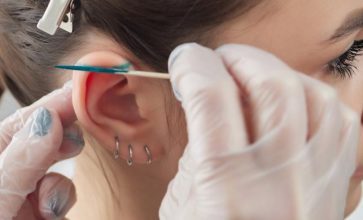What Skin Care Products Do I Need To Reduce Dark Spots?
If you find yourself asking what skin care products do I need to eliminate dark spots, you�re not alone. Dark spots, also known as hyperpigmentation, can be a common skin concern and selecting the right products is crucial for an effective skincare routine.
Dark spots can emerge due to various factors such as sun exposure, aging, and hormonal changes. These pigmentations, though harmless, can impact the evenness of your skin tone, prompting the need for a strategic approach to skincare.
Answering what skin care products do I need, you can achieve skin free of dark spots and a more luminous face. Tailor your skincare routine to address the root causes of your dark spots, and with consistency and patience, you�ll witness transformative results.
What Are The Causes Of Dark Spots?
Dark spots, often referred to as hyperpigmentation, can be a source of concern for many individuals seeking clear and radiant skin. To effectively address these unwanted blemishes, it�s crucial to comprehend the various causes behind their appearance. In this exploration, we will deepen into the common cause of dark spots and shed light on the question: �What skincare products do I need?�.
Sun:�
Prolonged exposure to UV rays is a primary reason for the development of dark spots. Sunspots, also known as solar lentigines or liver spots, are a common type of dark spot caused by prolonged sun exposure. The UV rays stimulate melanin production, leading to uneven pigmentation. So, incorporating sunscreen into your skincare routine is key in preventing and minimizing dark spots.
Inflammation and acne:�
These conditions can result in post-inflammatory hyperpigmentation. Treating post-acne dark spots involves targeted skincare products that assist in pigment correction.
Hormonal changes:�
Hormonal fluctuations can contribute to the development of dark spots. Managing hormonal-induced hyperpigmentation requires an exhaustive focus, including products that address melanin regulation.
Aging and skin damage:
Age spots, or senile lentigines, are dark spots that develop with age, often appearing on areas exposed to the sun. Also, cumulative skin damage from environmental stressors can result in dark spots over time. They are associated with the natural aging process and can be addressed with products containing retinoids.
Genetic:�
Obviously, genetic factors can influence the predisposition to dark spots. Unlike dark spots caused by sun exposure or hormonal changes, genetic dark spots are deeply rooted in one?s DNA. While genetic dark spots may be challenging to eliminate entirely, a consistent and personalized skincare routine can contribute to a more even-toned complexion.
Melasma:�
This condition is characterized by dark patches, usually on the face, triggered by hormonal changes, such as pregnancy or birth control use. Treatment for melasma often involves skincare products that inhibit melanin production. It requires skincare products designed to hinder melanin production with ingredients like hydroquinone, kojic acid, and niacinamide.
Understanding the different types of dark spots you can make correct decisions about your skincare routine. The question then becomes: what skincare products do I need to include in my routine to address unique dark spot concerns? The key to treating dark spots effectively lies in tailored knowledge, considering the specific type of hyperpigmentation. By incorporating the right skincare products, such as brightening serums, retinoids, and sun protection, you can solve this concern.

What Skin Care Products Do I Need To Get Rid Of Dark Spots?
Let?s learn about the essentials of skincare with a guide, answering the pivotal question: �What skincare products do I need?� and detect the solutions that can effectively reduce dark spots, helping you towards a clearer and more radiant complexion. Let?s discover how to get rid of dark spots.
Gentle cleanser:�
Before diving into targeted treatments, start with a gentle cleanser to rid the skin of impurities and prepare it for effective absorption of subsequent products. Look for a cleanser with soothing ingredients like chamomile or aloe vera.
Exfoliator:�
This product helps shed dead skin cells, promoting cell turnover. Choose products with ingredients like alpha hydroxy acids (AHAs) or beta hydroxy acids (BHAs).
Vitamin C serum:�
Renowned as a potent antioxidant, it can fade dark spots. A vitamin C serum can be an ally in addressing hyperpigmentation while providing protection against environmental damage.
Niacinamide:�
Known as vitamin B is a versatile ingredient known for its brightening properties. It helps reduce the appearance of dark spots, controls sebum and enhances the texture of the skin.
Retinol:�
This powerful ingredient aids in cell turnover and collagen production. It?s effective in minimizing dark spots, fine lines and crumples. It is recommended to start with a lower concentration and gradually increase to avoid irritation.
Moisturizer:�
Keeping the skin hydrated is essential for its health and appearance. Select a moisturizer containing hyaluronic acid or glycerin to guarantee accurate hydration without clogging pores.
Sunscreen:�
To prevent further darkening of existing spots and protect against new ones it is necessary using sun protection. Look for one with at least SPF 30.
Mask:�
Including into the routine a face mask it is likely to minimize the stains. Loof for ingredients like vitamin c, glycolic acid, niacinamide, extract or alpha arbutin, lactic acid, white or pink clay.
Night antioxidant cream:�
To conclude your day, opt for a routine with antioxidants to provide your skin with essential nutrients while you sleep, aiding in the repair process.
Conclusion
Achieving a luminous complexion and bidding farewell to dark spots requires consistency and the right arsenal of products. By understanding the answer to the question, �What skin care products do I need?� and tailoring your routine accordingly, you can unlock the path to radiant, spot-free skin. Patience is key, and results often manifest with dedicated and long-term care.
More Resources:






















